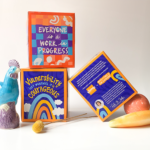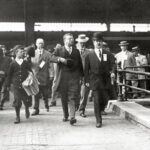The UWM Libraries and the Roberto Hernandez Center have collaborated in a new podcast showcasing Latinx history at UWM and in Milwaukee.
The podcast will be formally launched Oct. 5 at a HOLA Archives Podcast Project reception in the Golda Meir Library Fourth Floor Conference Center from 5 to 7 p.m.
The first two episodes of the podcast are already available online on the library’s website.
The podcast draws on extensive oral histories housed in the UWM Archives, which were collected for the Roberto Hernandez Center’s 50th anniversary. The podcasts will also use materials from the Wisconsin Historical Society.
Alberto Maldonado, director of the Roberto Hernandez Center, worked with Ann Hanlon, head of digital collections and initiatives and Digital Humanities Services, to develop the podcast, titled HOLA Archives Podcast Project. A grant from the Wisconsin Humanities Council supported the effort.
“The podcasts will feature the people, places and moments that are important in our history,” Maldonado said.
He did the introduction, while Hanlon wrote the script and Gabriela Dorantes, senior advisor and multicultural student success coordinator at the Roberto Hernandez Center, narrated.
The team also relied on the research and history written by Joseph Rodriguez, professor of history. “He was pretty indispensable,” said Maldonado.
The first episode features the voices of those early Latino/a students and community activists who led protests and a takeover of the chancellor’s office in 1970. This episode draws on Rodriguez’s 2005 article, “Latinos at UWM: A History of the Spanish Speaking Outreach Institute and the Roberto Hernandez Center.
Episode two draws on Patricia Torres Najera’s dissertation, “We Were the Outsiders and Treated as Such: Community Activism and the Intersections of Ethnicity, Gender, Class and Race Among Latinas in Milwaukee.”
Many Latino activists attributed the low enrollment of Latinx students to a lack of support at the university: Few administrators or advisers spoke Spanish, there existed no support center for Latinx students, and there were no means of transportation to the Kenwood campus. The absence of these resources provided barriers and very little incentive for Latinx students to enroll at UWM.
The protests eventually led to the formation of the Spanish Speaking Outreach Institute, which later became the Robert Hernández Center, named for one of those pioneers. Drawing on the oral histories, the speakers talk about their experiences in making change and encouraging UWM to become a more welcoming place.
While UWM billed itself as an urban university in 1970, the podcast points out that in 1971, there were only 12 Latino/a students on campus, none of them from Milwaukee. As of the start of the 2023 fall semester, 743 Latinx and multicultural (including some Latinx background) students were enrolled at UWM, and made up approximately 18% of the incoming class.







